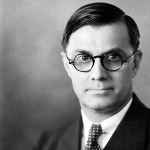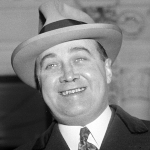Background
Herman E. Talmadge was born on August 9, 1913, in McRae, Georgia, United States. He was the son of Eugene and Mattie Talmadge.


50 Constitution Ave NE, Washington, DC 20510, United States
The select Senate Watergate Committee begins its investigation into the Watergate scandal in the Senate Caucus Room before a nationwide TV audience. Shown here, left to right are Senator Edward Gurney; Senator Howard Baker, assistant chairman; Senator and chairman Sam J. Ervin; Samuel Dashi, chief counsel; and Senator Herman Talmadge.
Athens, GA 30602, United States
In 1936 Herman E. Talmadge received a Bachelor of Laws degree from the University of Georgia School of Law.
A potent figure, Herman E. Talmadge a shoo-in for Georgia Senatorship, smiling smugly during his Florida vacation after withdrawal. Photo by Robert W. Kelley
Herman E. Talmadge listening to the radio. Photo by Yale Joel
Governor Herman E. Talmadge of Georgia during the election campaign. Photo by Francis Miller
Governor Herman E. Talmadge of Georgia speaking during the election campaign. Photo by Francis Miller
Governor Herman E. Talmadge (R) with wife going over notes. Photo by Francis Miller
Governors Herman E. Talmadge (L) and Gordon Browning (CR), attending the Governor's conference. Photo by John Dominis
Governors Paul Dever (L) and Herman E. Talmadge (2R), having lunch while attending the Governor's conference. Photo by John Dominis
Senator of Georgia, Herman E. Talmadge, in the backyard of the home. Photo by Leonard McCombe
Senator Herman Talmadge listening to testimony during Watergate hearings. Photo by Gjon Mili
Herman E. Talmadge discussing the farm surplus problem. Photo by Paul Schutzer
50 Constitution Ave NE, Washington, DC 20510, United States
The select Senate Watergate Committee begins its investigation into the Watergate scandal in the Senate Caucus Room before a nationwide TV audience. Shown here, left to right are Senator Edward Gurney; Senator Howard Baker, assistant chairman; Senator and chairman Sam J. Ervin; Samuel Dashi, chief counsel; and Senator Herman Talmadge.
Photo Credit: Chris Hunt
















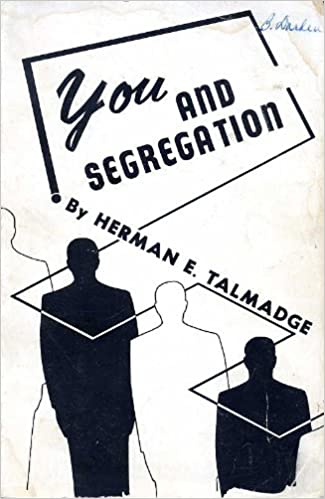
(A tract which expresses vehement protest against upcoming...)
A tract which expresses vehement protest against upcoming legislation for desegregation. Talmadge, a politician from Georgia, goes a little 'over the top' but it is an accurate document of how bad things were when it was first published in 1955.
https://www.amazon.com/You-Segregation-Herman-Talmadge/dp/B0007DWXI2/ref=sr_1_1?dchild=1&keywords=You+and+Segregation&qid=1607067740&s=books&sr=1-1
1955
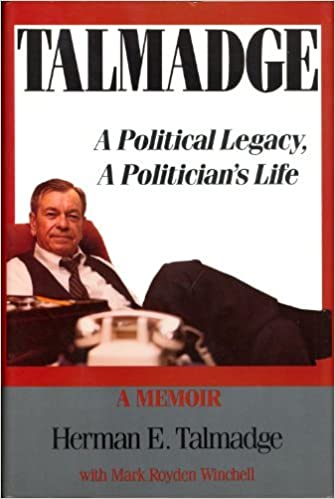
(In this important political and personal memoir, Senator ...)
In this important political and personal memoir, Senator Herman Talmadge writes candidly about power, politics, his personal life, and hundreds of powerful - and sometimes pitiful - political figures he knows.
https://www.amazon.com/Talmadge-Political-Legacy-Politicians-Memoir/dp/0934601232/ref=sr_1_1?dchild=1&keywords=Talmadge%3A+A+Politician%E2%80%99s+Life&qid=1607068132&s=books&sr=1-1
1987
Herman E. Talmadge was born on August 9, 1913, in McRae, Georgia, United States. He was the son of Eugene and Mattie Talmadge.
Herman E. Talmadge attended public schools until his senior year when his family moved to Atlanta. In 1936 he received a Bachelor of Laws degree from the University of Georgia School of Law.
In 1936 Herman E. Talmadge was admitted to the bar and then began establishing a legal career, joining his father’s law practice in Atlanta. During World War II, he enlisted and was commissioned an ensign, serving in the United States Naval Reserve. Talmadge also participated in the invasion of Guadalcanal and the battle of Okinawa, and retired from active duty in 1946, with the rank of lieutenant commander.
Talmadge's first involvement in politics was as his father's campaign manager in 1946. Running for an unprecedented fourth term as governor of Georgia, Eugene Talmadge was elected in November 1946 but was in failing health. As a precaution, a small group of Talmadge supporters started a write-in campaign for Herman Talmadge during the general election. When the elder Talmadge died in December 1946, before being sworn in as governor, the Georgia General Assembly elected his son governor by a vote of 161 to 87. But outgoing Governor Ellis Arnall refused to surrender his office unless it was to elected-Lieutenant Governor Melvin E. Thompson. After a period of uncertainty, the Georgia Supreme Court ruled that the constitutional portion under which the General Assembly had elected Herman Talmadge did not apply. The court declared M. E. Thompson acting governor until a special election could be held. In September 1948, Talmadge was elected governor and re-elected in 1950, serving until January 1955.
When Senator Walter George officially announced his decision not to run for United States Senate, Talmadge started campaigning to take his place. Once again he was opposed by M. E. Thompson but defeated him in the Democratic primary. With no Republican opposition in the general election in November 1956, Talmadge was elected United States senator. The civil rights movement of the 1950s ultimately affected equal rights legislation for African-Americans and eliminated segregated public facilities in the South. Although progress toward integrating public schools was achieved, a majority of whites in the South remained adamant in their resistance to desegregation. As part of that majority, Talmadge had voiced his opposition as early as the 1948 Democratic Convention when President Harry Truman tried to add civil rights to the platform. And in response to the Supreme Court ruling in Brown vs. Board of Education, Talmadge authored a book in 1955 about the wisdom of segregated education entitled You and Segregation.
When Talmadge officially began his term as the junior senator from Georgia in January 1957, he immediately joined the other Southern Democrats in their fight against civil rights legislation. In response to the crisis of integrating Little Rock Central High School in Arkansas, Talmadge proposed a constitutional amendment in 1959 that would have permitted the state and local governments to decide whether or not to keep their schools segregated. This proposal was the first acknowledgment from a southern senator that Brown vs. Board of Education was an established fact. Having won a seat on the Agriculture Committee in 1957, Talmadge wielded his greatest influence on bills that affected American farmers and agriculture. By 1971, he had become chairman of the Senate Committee on Agriculture, Nutrition, and Forestry. Some of his major accomplishments in this area included guiding the passage of a series of acts, which established price support programs for peanuts, cotton, wheat, and other commodities.
In 1973 Senator Talmadge received national attention as part of the Senate committee investigating the Watergate scandal. Watergate involved corruption and its coverup by United States president Richard Nixon and members of his administration, leading to Nixon's resignation from office in August 1974. Talmadge won praise for his folksy yet intelligent questions during the committee's televised hearings. Talmadge ran into personal and political troubles in the late 1970s: after he and his wife divorced, his alcoholism became public, and he was investigated by a Senate ethics committee, which found him guilty of misusing campaign funds. Although he ran for reelection in 1980, he was defeated by Mack Mattingly.
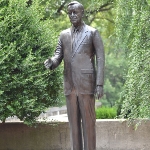
Herman E. Talmadge is best remembered for his contribution as the Governor of Georgia. He helped effect a great deal of progressive change in the Georgia government and public education. He was a key national figure in the formation of legislation aimed at aiding rural America. He achieved his greatest national prominence through his role on the Senate Select Committee on Presidential Campaign Activities, which investigated the Watergate scandal and ultimately led to the resignation of the president and vice president of the United States, as well as the conviction of three cabinet members on felony charges. In 1975, he was named Man of the Year by Morris Brown College.
(In this important political and personal memoir, Senator ...)
1987(A tract which expresses vehement protest against upcoming...)
1955Herman E. Talmadge helped to create the Georgia Forestry Commission and established timber as a major crop in the state. He helped establish the Farmers' Market system and helped in the building of the Rock Eagle 4-H Center by providing funds to match money raised by 4-H members and contributors. A strong supporter of the College of Agriculture, he was responsible for overall increased federal funding for Georgia agriculture. He initiated the Rural Development Act and was a prime supporter of the Hill-Burton Act, which provided funds for rural hospitals. As chairman of the United States Senate Committee on Agriculture, Nutrition, and Forestry, he was the country's leading spokesman for agribusiness and rural issues.
As governor, Herman E. Talmadge was noted for his support of racial segregation. In 1948, according to Bill Shipp in Georgia Trend, Talmadge stood up before a crowd of people and shouted, "The greatest challenge facing Georgia today is preserving our way of life!" He was referring to preserving the practice of racial segregation, which legally enforced whites-only restaurants, public waiting rooms, restrooms, water fountains, and schools. However, as Shipp noted, support for this position was so common at the time that Talmadge "wasn't even considered the worst racist around, not by a long shot."
When the United States Supreme Court outlawed racial segregation in 1954, Talmadge direly predicted that "blood will run" in Atlanta’s streets, according to Shipp. Adam Clymer noted in the New York Times that Talmadge also said, "There aren’t enough troops in the whole United States to make white people of this state send their children to school with colored children." In 1956, according to Clymer, Talmadge said, "God advocates segregation." Paradoxically, however, he ensured that African-American teachers' salaries were equal to those of white teachers, a move that garnered no political support at the time.
Quotations:
"You all got only three friends in this world: The Lord God Almighty, the Sears Roebuck catalog, and Eugene Talmadge. And you can only vote for one of them."
"I may… surprise you - but I shall not deceive you."
Hernan E. Talmadge was a member of the American Bar Association, the American Legion, the Veterans of Foreign Wars, the Georgia Bar Association, and the Atlanta Bar Association. He was also a member of the Freemasonry and Shriners.
In 1937 Herman E. Talmadge married Katherine Williamson. They divorced three years later. In 1941 he married Betty Shingler, and they had two sons, Herman Eugene Jr. and Robert Shingler. In 1975, his son Robert drowned in a swimming accident at Lake Lanier. In 1977 the couple divorced. In 1984 married Lynda Cowert Pierce.
